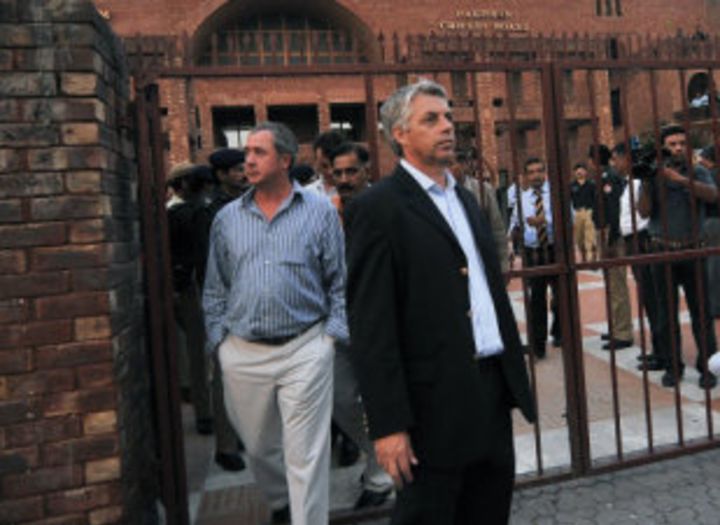'FICA will be around for a long while' - Tim May
Tim May, the outgoing FICA chief, said it was disappointing to not see major improvements in the governance of cricket in the 16 years of his role as a players representative, but he hoped FICA is able to continue to push for change

Tim May, the outgoing FICA chief, said it was disappointing to not see major improvements in the governance of cricket in the 16 years of his role as a players representative, but he hoped FICA is able to continue to push for change. He spoke to ESPNcricinfo after announcing his decision to step down.
How much of a factor in your decision to quit was the way you lost your position on the ICC cricket committee?
"It was probably just confirmation of one of the reasons I wanted to leave. To take it back a step, at the 2012 annual meeting of FICA, which was held in September in Colombo, I actually advised the FICA board that I would be resigning some time in 2013. It was going to be more towards the third quarter of 2013 but we had a meeting here in Austin, Texas in late May and I just decided that the time was right. I had lost confidence in the ability of our sport to govern itself."
Will it be an even greater challenge for your successor without that voice?
"It won't be any tougher, it will be the same old same old. It needs someone who has a full tank of energy and passion to attack these issues, and push for change, especially in the governance structure at the ICC, which has been called upon by the Woolf Report. That was the ICC's own commissioned report and it rejected it flatly, basically. After you do this for about 16 years you tend to run out of gas. There are significant problems and issues that should be easily resolved in any other walk of life that tend to take a significant amount of time in this game. After a while it just weighs you down."
Do you think the recent issues around allegations of IPL spot-fixing and the upheaval within the BCCI could be the spark cricket needs to instigate change?
"I think it certainly shows that there are people out there who share a belief that the governance in our game - albeit we're talking just about the BCCI here - is not what it should be. That engenders hope in you that there are people with good principles around who will push for change. Fingers crossed, because they desperately need that on the ICC board. It's about time they governed according to what's best for the global game rather than one or two boards."
Is there another worldwide sport that sets the bar in terms of its governance?
"That's a good question. Sport administration is a progression from sport to business and I don't think the majority of sports have really found the right balance in the personnel and governance structures. I know it's Australian and not worldwide, but I do like how the Australian Football League is run. It has a commission, it has independence, it has got a good, strong CEO who I respect very highly. They have their share of problems ... but I think that is an exceptionally well-governed sport."
How disappointing is it to have been involved in player associations for 16 years without seeing cricket's governance improve significantly?
"I don't know if it's a disappointment or just sheer frustration. It's not up to us to execute that change. It's the ICC itself. We are there as watchdogs, to question, to make them accountable and it's been frustrating that we haven't had the success in ensuring that the game is governed correctly. That is frustrating. But there are some strong principled people on the ICC executive board who will perhaps have a look around at the landscape and what has been happening in the last few weeks, to see what dangerous path we may well be going down now, and that it may be time to re-examine that Woolf Report and get in a nice, solid structure of governance. Because you need your governance from the top down. That's not just for sport, that's for any business. And you need to police all your principles."
What are you proudest of having achieved in your time with FICA?
"Despite significant opposition from a number of boards, we've managed to build the number of player associations from basically one in 1997, to now seven effective player associations in the ten Test-playing nations. Not only assisting to construct those player associations but also maintaining them under significant opposition from member boards who don't particularly want player associations in their territory, because they don't seem to want to be accountable."
Where to now for FICA, given that you personally have been such a driving force behind it?
"It's certainly going to survive without me. I'm merely an employee passing through. The strength of FICA is the player associations that lay under its umbrella. They are strong player associations; they have got good people with good principles. FICA will be around for a long while yet."
And what's next for you?
"Next for me is a period of rest. I'm free from worrying about if I'm going to get Player A's money so he can afford his mortgage, or whatever, and just the continuing issues that we face. I can now leave them to someone else and wake up and spend a bit of family time for the next few months."
Brydon Coverdale is an assistant editor at ESPNcricinfo. He tweets here
Read in App
Elevate your reading experience on ESPNcricinfo App.